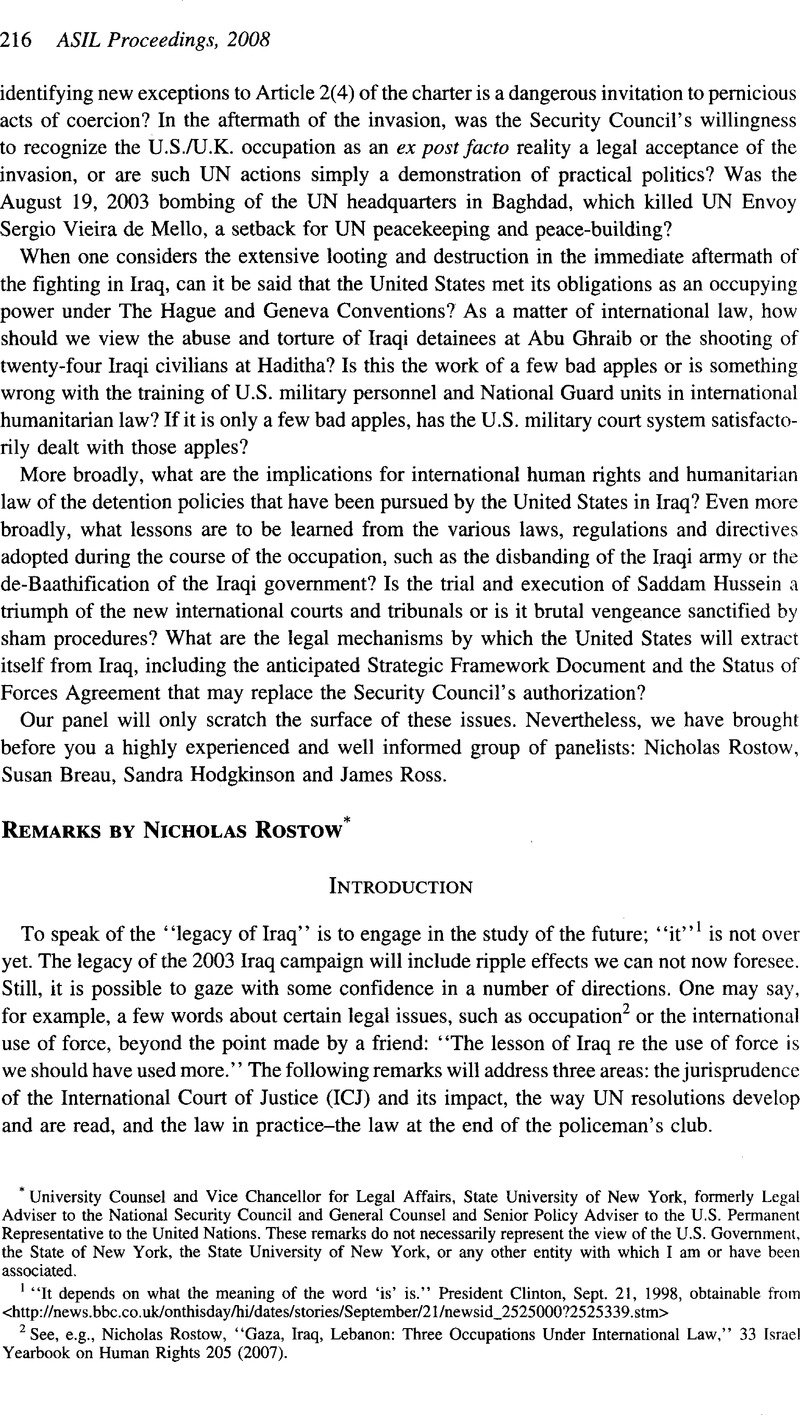No CrossRef data available.
Article contents
Remarks by Nicholas Rostow
Published online by Cambridge University Press: 28 February 2017
Abstract

- Type
- The Legacy of the Iraq War: Impact on International Law
- Information
- Copyright
- Copyright © American Society of International Law 2008
References
1 “It depends on what the meaning of the word ‘is’ is.” President Clinton, Sept. 21, 1998, obtainable from <http://news.bbc.co.uk/onthisday/hi/dates/stories/September/21/newsid_252500072525339.stm>
2 See, e.g., Rostow, Nicholas, “Gaza, Iraq, Lebanon: Three Occupations Under International Law,” 33 Israel Yearbook on Human Rights 205 (2007)Google Scholar.
3 This section is based on material in my article on the ICJ’s Advisory Opinion on the Israeli “wall,” Wall of Reason: Alan Dershowitz v. The International Court of Justice, 71 Alb. L. Rev. 953 (2008).
4 UN Chart. Art. 51 (“Nothing in the present Charter shall impair the inherent right of individual or collective self-defense if an armed attack occurs. ..”)
5 Corfu Channel (UK v. Alb.), merits, 1949 ICJ Rep. 4 (Apr. 9).
6 Oil Platforms (Iran v. U.S.), Judgment, 2003 ICJ Rep. 161 (Nov. 6). The dicta on the use of force had nothing to do with the ruling. Iran brought the action in response to U.S. military action against Iranian offshore oil platforms the United States had determined were being used as bases for attacks on U.S.-flag vessels. The U.S. action was designed to prevent such use of the platforms.
7 Military and Paramilitary Activities in and against Nicaragua (Nicar. v. U.S.) Merits, 1986 ICJ Rep. 14 (June 27).
8 Oil Platforms, supra note , at para. 64.
9 Taft, supra note x, at 300-01.
10 J. L. Brierly, The Law of Nations 5th at 326 (1955).
11 ‘ Legal Consequences of the Construction of a Wall in the Occupied Palestinian Territory, Advisory Opinion, 2004 ICJ Rep. 136 (Jul. 9) at 194, para. 139.
12 UN Chart. Art. 51.
13 SC Res. 1268 (2001).
14 SC Res. 1373 (2001).
15 See, e.g., UN Scor, 57th Sess., 4506the mtg., UN Doc. S/PV.4506 (Resumption 2) (2002); 4510th mtg.; 4588th mtg.; UN Scor 58th Sess., 4685th mtg., UN Doc. S/PV.4685; Quartet Communique, May 4, 2004.
16 In its opinion on the Legality of the Threat or Use of Nuclear Weapons, Advisory Opinion, 1996 ICJ Rep. 226 (Jul. 8), the ICJ wrote that “General Assembly resolutions, even if they are not binding, may have normative value. They can, in certain circumstances, provide evidence important for establishing the existence of a rule or the emergence of an opinio juris.” At 254-55. Such a conclusion is inconsistent with most States’ understanding and, if followed, would force States to begin each statement at the United Nations with a declaration as to the legal import of a particular resolution, whether in the General Assembly or the Security Council. UN diplomats and functionaries would not welcome such a practice.
17 Bribes are known to have occurred.
18 From its founding until August 1990 (forty-five years), the UN Security Council adopted 660 resolutions. In the past 18 years, the Council has adopted more than 1,150 resolutions.
19 See generally Taft, William H. IV & Buchwald, Todd F. Preemption, Iraq, and International Law, 97 AJIL 557 (2003)Google Scholar; the written answer of the Attorney General, Lord Goldsmith, to a Parliamentary Question on the legal basis for the use of force in Iraq, March 17, 2003 (UK Foreign and Commonwealth Office); Rostow, Nicholas, International Law and the 2003 Campaign against Iraq, in Issues in International Law and Military Operations (Jaques, Richard B. ed.), 80 International Law Studies 21 (2006)Google Scholar.
20 Rostow, supra note , at 26, 27.




